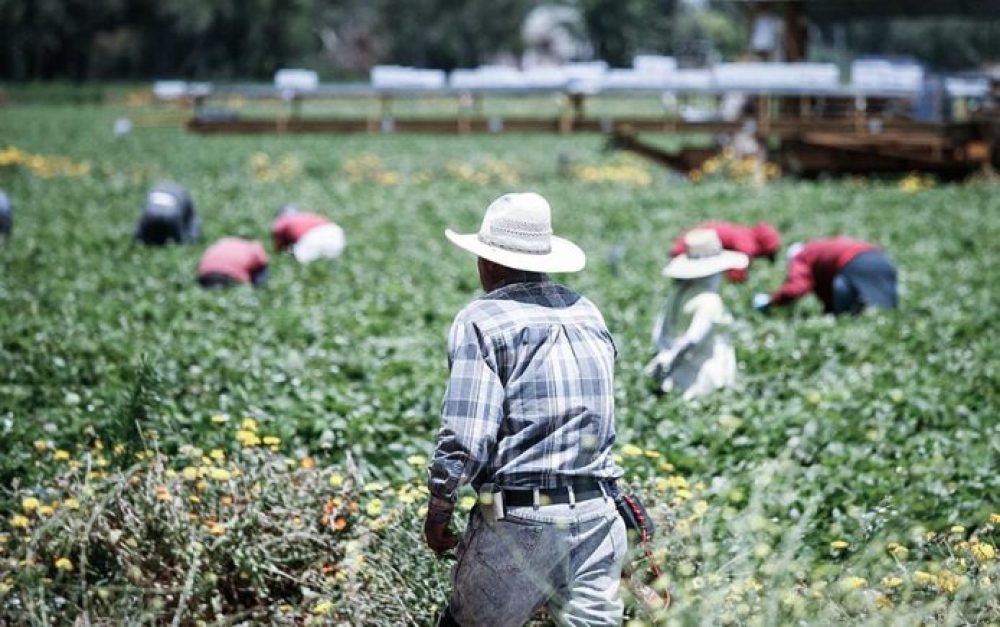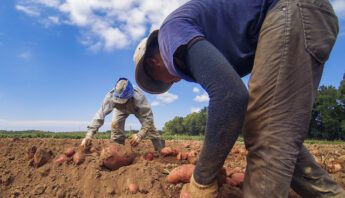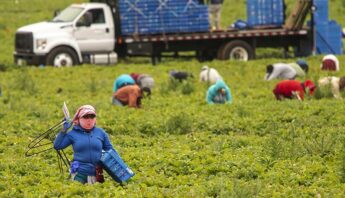This Farmworker Awareness Week, please join me in celebrating the two million men and women who toil throughout the year, coast to coast in U.S. agricultural fields bringing a cornucopia to tables in this country and around the world.
Thanks to everyone who joined us in celebrating Farmworker Awareness Week March 24-31, 2017. Read on for ways to honor the important contributions farmworkers make to our communities, and how to raise awareness about farmworker health, labor conditions and immigration reform throughout the year.
This Farmworker Awareness Week, please join me in celebrating the two million men and women who toil throughout the year, coast to coast in U.S. agricultural fields bringing a cornucopia to tables in this country and around the world.
There’s a lot that needs doing to better recognize and support these food warriors. But in the age of xenophobic Trump policies the top priority is clear: we must step up now to protect our brothers and sisters from rampant, unjust ICE raids that are plunging communities into fear and threatening to break our farming system.
Resisting ICE
From farmworker groups to the American Civil Liberties Union (ACLU), resisting the increasingly frequent and violent raids from Immigration and Customs Enforcement (ICE) is now front and center.
It’s an emerging priority for growers as well. Farm operations across the country are increasingly concerned about the impact of Trump’s immigration policies on the workers upon whom their businesses depend. Across the nation – from tomato farms in Michigan to apple orchards in Maine and dairy operations in New York — farms are seriously threatened by Trump’s inhumane and anti-business immigration policies.
For years, groups like United Farmworkers (UFW), Northwest Treeplanters and Farmworkers United (PCUN) and the Farm Labor Organizing Committee (FLOC) have been raising awareness of the great productivity and exploitation of agricultural workers. These farmworker unions are right, and their work is now more important than ever.
To help combat this exploitation and support farmworker communities in this time of fear and uncertainty, lend your support to organizations working for farmworker justice. Call your elected officials and express your opposition to the ICE raids. Make legal or translational skills and services available if you have them to offer. And join your local resistance movement — attend rallies and protests, and share information and stories on your social media platforms.
Now is also the time to renew conversations about what’s really needed – real, meaningful immigration reform, and farm policies that bring dignity, safety and fair compensation to field workers.
Time for immigration reform?
A recent congressional agriculture hearing on specialty crops (fruits, nuts & vegetables, where most farmworkers are employed) included the testimony of one multi-state farm produce company saying that an adequate, legal labor force is the industry’s “most pressing issue.” Illustrative of this is the fact that about 70 percent of the agricultural workforce in California is undocumented.
One way growers have responded is by hiring seasonal H-2A guest workers with visas acquired from the Department of Labor. That program accounts for about 150,000 guest workers a year, about 10 percent of what is required — and that number continues to grow.
But the current H-2A program is seriously flawed. It provides temporary workers with visas tied to specific companies, and this lack of portable visas often leads to abuses, such as wage theft and sexual harassment and workers fear retaliation — especially by recruiting agents — if they complain. Plus in this overly bureaucratic and expensive program, workers cost about 40 percent more than other laborers due to grower obligated costs including recruitment, transport and housing.
The sentiment was clear at the congressional hearing that specialty crop growers “need a guest worker program that is affordable, reliable and reasonable, and that provides a pathway to legal status for the current workforce so that this expertise is not lost.”
The California Alliance of Family Farmers (CAFF) has proposed one program that does exactly that: the North American Agricultural Work Visa (NAAV) program. Thoughtful ideas like this could be the basis for new, solution-focused conversations for our broken immigration policies.
Speaking up matters
Obama’s attempt at comprehensive immigration reform failed despite support from the business community, evangelical Christian groups, police and sheriffs organizations, immigrant rights activists, liberal think tanks, Democratic lawmakers and Latino groups. Is it possible that in the confusion and urgency created by Trump’s policies, the time is now right to move forward with real, meaningful reform?
It’s clearly an uphill battle, and would need a groundswell of broad-based support. You can help make your support visible by taking actions like these right now, for Farmworker Awareness Week:
- Before March 31st, Join the United Farmworker’s Thunderclap. It literally takes a minute to sign up for both Twitter & Facebook and to share the campaign. On March 31 at 9am PST, the message supporting farm workers’ #CesarChavez #ResistTrump marches goes out at the same time on the feeds of everyone who signed up — flashmob-style.
- On Friday, March 31st, join Vermont-based Migrant Justice in calling Ben & Jerry’s (at 802- 846-1500) urging them to make good on their 2015 commitment to join the Milk with Dignity program. Tell them “Actions speak louder than words! Farmworkers’ human rights cannot wait!
- On April 2 join a UFW-sponsored march, happening in more than a dozen cities throughout California, Washington, Texas and Nevada on the weekend of Cesar Chavez’s birthday.
Photo: Alex Proimos | Flickr








